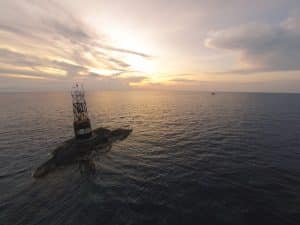Deep-sea mining backlash intensifies in Pacific nations

Deep-sea mining backlash intensifies in Pacific nations due to environmental concerns, leading to calls for stronger international regulations and exploration of sustainable alternatives to protect marine ecosystems.
Deep-sea mining backlash intensifies in Pacific nations as communities grapple with the environmental and economic risks.
Have you considered how this could impact the marine ecosystem and local livelihoods? Let’s dive into the details.
The urgency of environmental concerns
The urgency of environmental concerns surrounding deep-sea mining cannot be overstated.
As nations in the Pacific region face increasing proposals for these mining activities, the potential risks to the marine ecosystem become more apparent.
Many scientists warn that the impacts could be devastating. Marine life is already fragile, and disturbing it can lead to lasting damage.
For instance, the destruction of habitats can affect not only the creatures that live there but also local communities that rely on those resources for their livelihoods.
Key Environmental Impacts
Exploring deep-sea mining requires understanding its environmental ramifications:
- Destruction of marine ecosystems
- Pollution from mining waste
- Potential extinction of unique species
- Disruption of local fishing industries
As stakeholders examine these factors, a critical point to consider is the balance between economic benefits and the health of our oceans.
The prospect of job creation and revenue must be weighed against these significant environmental issues.
Recent studies reveal alarming trends in water quality near proposed mining sites. Contaminants can spread rapidly and affect vast areas, leading to a domino effect on marine biodiversity.
In addition, the construction and machinery required for mining operations are often noisy and disruptive, causing stress to marine animals.
The Role of Local Communities
Local communities express growing concern about how deep-sea mining will impact their way of life.
Many rely on fishing and tourism, both of which could suffer if marine ecosystems are harmed. Community voices are crucial in the dialogue around this issue, as they often have the most to lose.
Ultimately, the urgency of these environmental concerns requires immediate action from governments and international bodies to assess and mitigate risks.
We must prioritize the health of our oceans while considering economic development. Balancing these competing interests is no small task but essential for sustainable progress.
Voices from Pacific communities

The voices from Pacific communities play a vital role in the conversation about deep-sea mining.
These communities often face the direct consequences of environmental changes, which makes their perspectives invaluable. Listening to their experiences can help stakeholders make more informed decisions.
Many residents express profound concern over how mining will affect their daily lives. Fishing is not just a job; it’s a way of life and a cultural heritage.
When community members share their stories, it highlights the human impact of potential environmental degradation.
Community Perspectives
Here are some key concerns voiced by Pacific communities:
- Threats to traditional fishing grounds
- Declining fish populations
- Changes in water quality
- Loss of cultural sites along coastlines
In these conversations, local leaders call for more significant involvement in decision-making processes. They emphasize the importance of including indigenous knowledge, which often provides insights that scientific data alone cannot offer.
By valuing these voices, it becomes possible to create strategies that consider both economic growth and environmental protection.
Community meetings often reflect deep emotional ties to the sea. Many elders share stories that illustrate the long history of sustainable practices passed down through generations.
This heritage shapes the communities’ identities, making any threat to marine environments deeply personal.
Calls for Action
As concerns grow, communities are uniting to advocate for sustainable practices. Increased public awareness is driving movements that seek to halt reckless mining operations.
These groups stress the need for careful ecological assessments and a reassessment of regulatory frameworks that govern ocean resource extraction.
Voices from Pacific communities are essential for guiding the future of deep-sea mining. Their stories and calls for responsible stewardship reflect a broader desire for balance between development and environmental conservation.
Recognizing and amplifying these perspectives is crucial to achieving sustainable outcomes in the planning of deep-sea mining activities.
Economic implications of deep-sea mining
The economic implications of deep-sea mining are significant and complex. As countries consider tapping into the ocean’s resources, they weigh the potential economic benefits against environmental costs.
These decisions can shape the future of many coastal communities and their economies.
Many proponents argue that deep-sea mining can provide jobs and boost local economies. Nations may see a substantial inflow of revenue from the extraction of precious metals and minerals found on the ocean floor.
For instance, some argue that mining could lead to new opportunities in technology and industry.
Key Economic Benefits
Here are some potential economic benefits associated with deep-sea mining:
- Creation of new jobs in mining and support industries
- Increased investment in local infrastructure
- Boost to related sectors, such as technology and transportation
- Enhanced governmental revenue through taxes and royalties
However, it is crucial to consider the long-term sustainability of these benefits. Short-term economic gains may come at the expense of long-term environmental health, which can ultimately harm the fishing and tourism industries that many communities rely upon.
The risk of ecological damage raises critical questions about whether the economic upsides justify the potential costs.
Moreover, the global demand for resources can fluctuate, affecting the viability of deep-sea mining operations.
If prices drop, investments may not yield the expected returns, leaving communities vulnerable. The reliance on a single industry could lead to economic instability if mining operations cease or decline.
Local Economic Impact
Local communities may feel the effects of deep-sea mining in various ways. While some might benefit from new jobs, others could face challenges.
For instance, fishing communities may notice a decline in fish populations due to the disturbances caused by mining activities. The potential for pollution can threaten traditional livelihoods and the economic stability of these areas.
In addition, the potential for conflict is evident as communities grapple with shifting economic dynamics. Disputes may arise over resource allocation, particularly if local populations feel excluded from decision-making processes.
The need for inclusive dialogue becomes essential in ensuring that the benefits of deep-sea mining are equitably distributed and do not disproportionately affect vulnerable populations.
Alternatives to deep-sea extraction
Exploring alternatives to deep-sea extraction is crucial as communities and governments seek sustainable solutions. These alternatives can help protect the delicate marine ecosystems while still meeting the increasing demand for resources.
One promising option is land-based mining. By focusing on extracting minerals from terrestrial sources, we can reduce the environmental impact of mining practices in the ocean.
This approach allows for better control of the mining process and minimizes disruption to marine habitats.
Renewable Resources
Another alternative involves turning to renewable resources. Using materials like biomaterials and recycled products can lessen the need for extraction.
For example, recycling metals reduces the demand for new materials, which can help conserve ocean resources.
- Investing in recycling technologies
- Developing bioengineered materials
- Utilizing secondary resources
Furthermore, marine permaculture offers a sustainable way to utilize ocean resources without causing harm. This practice involves cultivating seaweed and other edible plants that can provide food and materials while improving ocean health.
Another growing field is deep-sea tourism, which can offer economic benefits without the environmental costs associated with mining.
By promoting marine conservation and ensuring that communities receive benefits from tourism, we can encourage protection of marine environments.
Legislation and Regulation
Enacting stronger legislation can help protect against unsustainable practices. Governments can prioritize conservation efforts and create policies that support alternative industries.
Regulatory frameworks can encourage responsible resource extraction and promote sustainable practices.
In summary, exploring these alternatives can help ensure the health of our oceans while fulfilling economic needs.
By focusing on sustainable practices, we can protect marine ecosystems for future generations and reduce the reliance on deep-sea mining operations, fostering balance between economic growth and environmental stewardship.
The role of international regulations
The role of international regulations is crucial in managing deep-sea mining activities. As these operations extend beyond national borders, they pose unique challenges that require coordinated efforts among nations.
Effective regulations can help protect marine environments while balancing the economic needs of countries.
One of the most significant agreements is the United Nations Convention on the Law of the Sea (UNCLOS).
This framework establishes guidelines for the use of ocean resources while ensuring that the marine environment is preserved. It emphasizes the need for sustainable practices and comprehensive management of ocean resources.
Key Components of International Regulations
Several essential components guide international regulations:
- Environmental Impact Assessments: Before any mining occurs, assessments are critical in understanding potential damages.
- Monitoring and Reporting Requirements: Continuous monitoring helps ensure compliance with environmental standards.
- Benefit Sharing: Policies that facilitate fair sharing of benefits derived from marine resources.
- Research and Development: Supporting research initiatives promotes sustainable mining practices.
International regulations also encourage collaboration between countries. By sharing research and resources, nations can work together to develop best practices for deep-sea mining.
This collaboration is vital in fostering a global commitment to sustainable ocean management.
Furthermore, non-governmental organizations (NGOs) play a significant role in advocating for stricter regulations.
These groups raise awareness about the impacts of mining and push for more robust policies. Their efforts can influence public opinion and encourage governments to act.
Challenges in Implementation
Despite the frameworks in place, implementing international regulations can be challenging. Different countries have varying interests and levels of commitment to environmental protection.
Additionally, the lack of enforcement mechanisms can lead to non-compliance, resulting in ecological damage.
As the demand for ocean resources grows, the role of international regulations will become even more critical.
It is essential for countries to prioritize cooperation and commitment to preserving our oceans for future generations. Strong regulations can mitigate the risks associated with deep-sea mining while allowing for responsible resource management.
FAQ – Frequently Asked Questions about Deep-Sea Mining Regulations
What are the main environmental concerns with deep-sea mining?
Deep-sea mining can lead to habitat destruction, pollution, and potential extinction of marine species, harming the delicate ecosystems.
How do international regulations impact deep-sea mining?
International regulations, like UNCLOS, set guidelines for sustainable mining practices, ensuring that marine environments are protected while resource extraction occurs.
What are some alternatives to deep-sea mining?
Alternatives include land-based mining, recycling materials, and promoting marine permaculture, which can reduce the need for ocean resource extraction.
Why is community input important in deep-sea mining discussions?
Community voices reflect the local impact of mining activities, ensuring decisions consider the livelihoods and rights of those who depend on marine resources.






